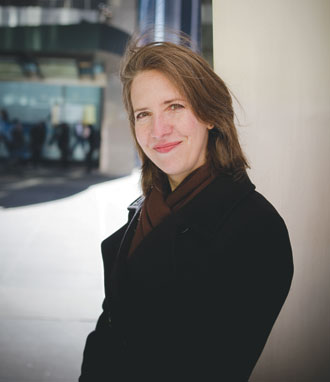 Gates Wide Open
Gates Wide Open
With the Web giving people unlimited access to information, journalists are no longer gatekeepers, but they can still serve as good editors.
Time magazine senior reporter Deirdre van Dyk '85 never intended to go into journalism. Her grandfather was William L. Shirer, the CBS foreign correspondent who wrote The Rise and Fall of the Third Reich. "Really," says van Dyk, "how do you top that?" Post-graduation travel led her to England and six years of various jobs (working for a movie producer, selling raincoats at Harrod's) before she returned to the U.S. to take the six-week Radcliffe Publishing Course. That, in turn, led to a job as editor of the listings page at the New York Observer. "It was a great first job to have in New York City, because you're poor and eating baked potatoes, but getting invited everywhere," she laughs. At Time, among other responsibilities, she serves as head reporter for the Style & Design issues.
Given the proliferation of news sources out there, blaring continuously from our computers and TVs and radios, how does a newsweekly like Time get readers' attention and stay relevant? Well, that's the key question. The way Time approaches it is that they are integrating their Web site and using it to stay abreast of breaking news. Minute-to-minute news is not really Time's focus, but they try and keep it current online. The editor-in-chief has decided that Time will focus on analysis, things that drive dinner conversation. A weekly magazine is usually going to be beaten on breaking news, but the idea is that people will pick up the magazine for its analysis, and that analysis will be smart enough to get people talking.
Do you think that there will still be a print version of Time ten or twenty years from now? People say print is dead. It's my personal opinion that you just can't beat it for portability. I saw somebody in the subway reading an electronic book, and I thought, what happens when it runs out of batteries? It's kind of a strain on your eyes. If you want to flip back a couple of pages, it's a pain. I just don't think anything beats the lightness and portability of a magazine. And you can throw it out when you're done. I think, especially for Time Style & Design, there'll always be a print version. The Web can't reproduce a beautiful photo spread.
Why is the news filled with gossip, lurid crimes, and other sensational stories? Shouldn't journalists focus more fully on topics of greater civic importance? Media are a reflection of society. I had a big argument with friends over the Heath Ledger thing. [The young actor's death in January received extensive media coverage.] People said, "It's terrible what they're doing." I said, if you think it's so terrible why are you sending me links about it every five minutes? But this is nothing new. In the Middle Ages, the big entertainment was going to watch a public execution. During the Civil War, people brought picnics to watch the fighting. We're all rubberneckers. It's human nature. With a free press, you're going to get the celebrity papparazzi running around, but you're also going to get the Economist, or Karen Tumulty [Time's national political correspondent], and Bobby Ghosh [Time's bureau chief in Baghdad].
Do media driven by commercial interests have the ability to serve the needs of democracy Sure. And there's not just commercial media, there are nonprofit media, too. Human Rights Watch, for example, does a great job. You don't have to get your news just from the for-profit media. Anything you want to find out about further, you can find your own sources and dig further. That's the beauty of the Internet. There's a transparency that the Web's brought to a lot of subjects. You can read the Congressional Quarterly. You can read trade magazines. You can go to the sources yourself.
What makes you optimistic about the future of journalism? That people are interested and want to read and know. And that the media are playing to a far more informed audience than they were before. Media are no longer the gatekeeper to information; instead, they're like a good editor. There's so much information out there; if you find a publication that has your sensibility, it can parse out what's interesting or important. As a reader, that's what I look for: somebody to entertain me and inform me and make me think.
Do you have feedback on this page?
